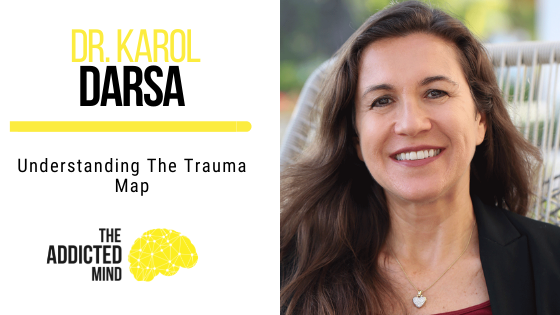On today’s episode, Duane speaks with Dr. Karol Darsa about how to recognize trauma as well as some of the first steps you need to take to deal with trauma. Karol is the author of the book, The Trauma Map: Five Steps to Reconnect With Yourself. She dives deep into how trauma impacts us in our everyday life as well as what we can do to deal with our traumatic histories so we can heal and feel better.
If you have struggled with some trauma in your past, hopefully you will get a lot of insights from this episode as Karol shares her professional wisdom on recovering from trauma. A licensed psychologist for 23 years, Karol found herself repeating certain information over and over again. She realized what was really missing in a lot of people’s minds was the understanding of what trauma is and what it does. Maybe they knew what trauma was but didn’t understand that it could impact them to the degree that it was impacting them.
Many people think trauma only applies to people who have been to war or were sexually abused. They don’t consider other things to be trauma. However, trauma can also result from smaller incidents when people didn’t even realize they felt traumatized.
Hoping to explain the basics of trauma and how it works, Karol decided to write the book, The Trauma Map: Five Steps to Reconnect With Yourself. Karol also noticed an overarching characteristic of self-blame among her clients who were dealing with trauma. They were quick to judge themselves much more than they should. Therefore, Karol also wrote the book as a great tool for minimizing self-blame.
In this episode, you will hear:
- What trauma is
- What the different types of trauma could look like
- Why the power of positive thinking sometimes backfires for people
- Recognizing relational trauma
- How trauma causes you to disconnect from your body
- Why people find it difficult to face painful situations
- Dismissing your feelings means a lack of self-acceptance
- How to eliminate self-blame
Key Quotes:
[03:49] – “What was really missing in a lot of people’s minds is really the understanding of what trauma is, and what it does.”
[04:57] – “The power of the positive thinking, sometimes that actually backfires for a lot of people.”
[05:56] – “Many people think trauma means if you been to war, or maybe if you were sexually abused, but other than that, people don’t consider other things as trauma.”
[06:31] – “Trauma is a situation where it’s so overwhelming that it makes you feel powerless, basically unable to cope.”
[07:13] – “The most common trauma that people minimize is relational trauma.”
[09:30] – “In the relational traumas, reactions don’t function that way. People have to be able to look at their symptoms and recognize it.”
[13:50] – “We have a limited capacity to actually face painful situations. As human beings, we all are that way.”
[17:17] – “One of the problems of dismissing feelings or putting things away or dismissing our body is that we are ultimately not accepting who we are.”
If you really enjoyed this episode, we’ve created a PDF that has all of the key information for you from the episode. Just go to the episode page at www.theaddictedmind.com to download it.
Supporting Resources:
Follow and Review: We’d love it even more if you could drop a review or 5-star rating over on Apple Podcasts. Simply select “Ratings and Reviews” and “Write a Review” then a quick line with your favorite part of the episode. It only takes a second and it helps spread the word about the podcast.
Supporting Resources:
If you live in California and are looking for counseling or therapy please check out Novus Mindful Life Counseling and Recovery Center
We want to hear from you. Leave us a message or ask us a question: https://www.speakpipe.com/addictedmind

